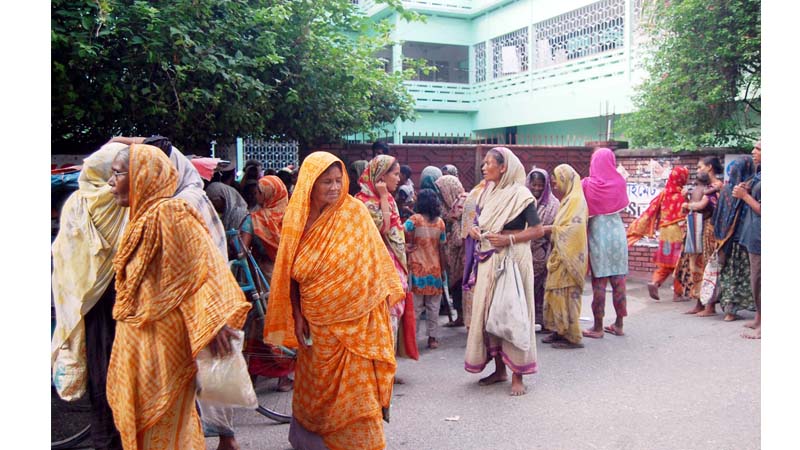Beggars’ bounty hunt in Khulna ahead of Eid

At a crossroads, a marketplace or a busy shopping mall everywhere in Khulna city, a good number of beggars, many of them seasonal ones, are seen scramble around seeking charity on the holy occasion of Eid.
They were begging money of Fitra and Zakat from passing shoppers at the shopping malls and on the streets. They also thronged different intersections and bus-launch terminals and the areas of mosques and shrines.
This huge number of floating people is taking shelter under the open sky at night in Khulna railway station, Sonadanga bus terminals, launch terminals and adjacent areas of different multi-stored commercial buildings. They use footpaths, drains and parks for defecation at dawn, according to statistics.
Many male and female beggars go from door to door, begging the money. Some rush towards private cars at traffic signals and shopping malls as the rich people hand out money to earn Almighty’s blessings.
Dozens of beggars are seen in KDA New Market, Tutpara and Basupara Graveyard, Nirala, in front of Khulna Medical College Hospital, Khulna Shishu Hospital, Khulna Sadar Hospital, Picture Palace Crossing, Dakbanglow Mor, Clay Road, Lower Jessore Road, Sir Iqbal Road, KD Ghosh Road, Cemetry Road, West Mekot Road, Helatola Road, Phulbari gate crossing, Phultala Bazaar are the main spots for begging.
Many female beggars carrying babies in arms were begging money at the places. They often hire the kids to draw people’s kind attention while begging.
A beggar, Nur Alam, who hailed from Kaliganj upazila under Satkhira district said, “I have come to Khulna city in Ramadan for begging, as there is no work at my village now. Last year, I begged around Tk 15,000 in Khulna during Eid festival.”
“I have come to Khulna for third time. Last year, I got Tk 20,000. This year, I expect more amount,” said another beggar Mahmudul Hasan of Dacope upazila under Khulna district.
Naushad is another in the horde, who was begging at Rupsha Ghat. He said that he came to Khulna to do the duty of night guard. “Afterwards, I started begging.”
Rumana Haque, a resident of Gallamari area in the city, told the Bangladesh Post that she gave money to at least 7-8 beggars on her way to Mina Bazaar for shopping. “Though begging is an act of hatred in Islam, I can’t say no to them during Eid festival,” Rumana says.
Convener of Khulna Nagorik Samaj Advocate AFM Mohsin said, “The beggar in Khulna city has increased alarmingly has poised a big challenge to the sanitation success in across the town. Their entry into Khulna has worried city authorities as these people are getting involved in disruptive activities.”
Sources in the law-enforcing agencies said members of the drug business syndicates force the beggar and floating women to paddle the drugs such as phensidyl, heroin and cannabis among the consumers, taking advantage of their helplessness.
Mayor of Khulna City Corporation (KCC) Talukdar Abdul Khaleque stressed that more than 25 percent of the population lives below the poverty line. The number of poor and ultra poor is increasing in Khulna city day by day. Frequent natural disasters make the situation worse, increasing the risk of vulnerability. Particularly, the south-western coastal belt of Bangladesh is one of the most disaster prone zones in the world where storm, cyclone, tidal surge, drought, river erosion and water-logging are now common.
Khaleque also said, “Khulna is regarded as one of the cheapest and the friendliest cities in Bangladesh. The city has very peaceful environment, free from mugging, toll-realising, extortion and musclemen. For being a friendly and livable city, a huge number of poor, landless people, mainly day labourers, are rushing to the city and taking shelter else-where on the pavement, beside the railway track, river banks and even at the open spaces.”




